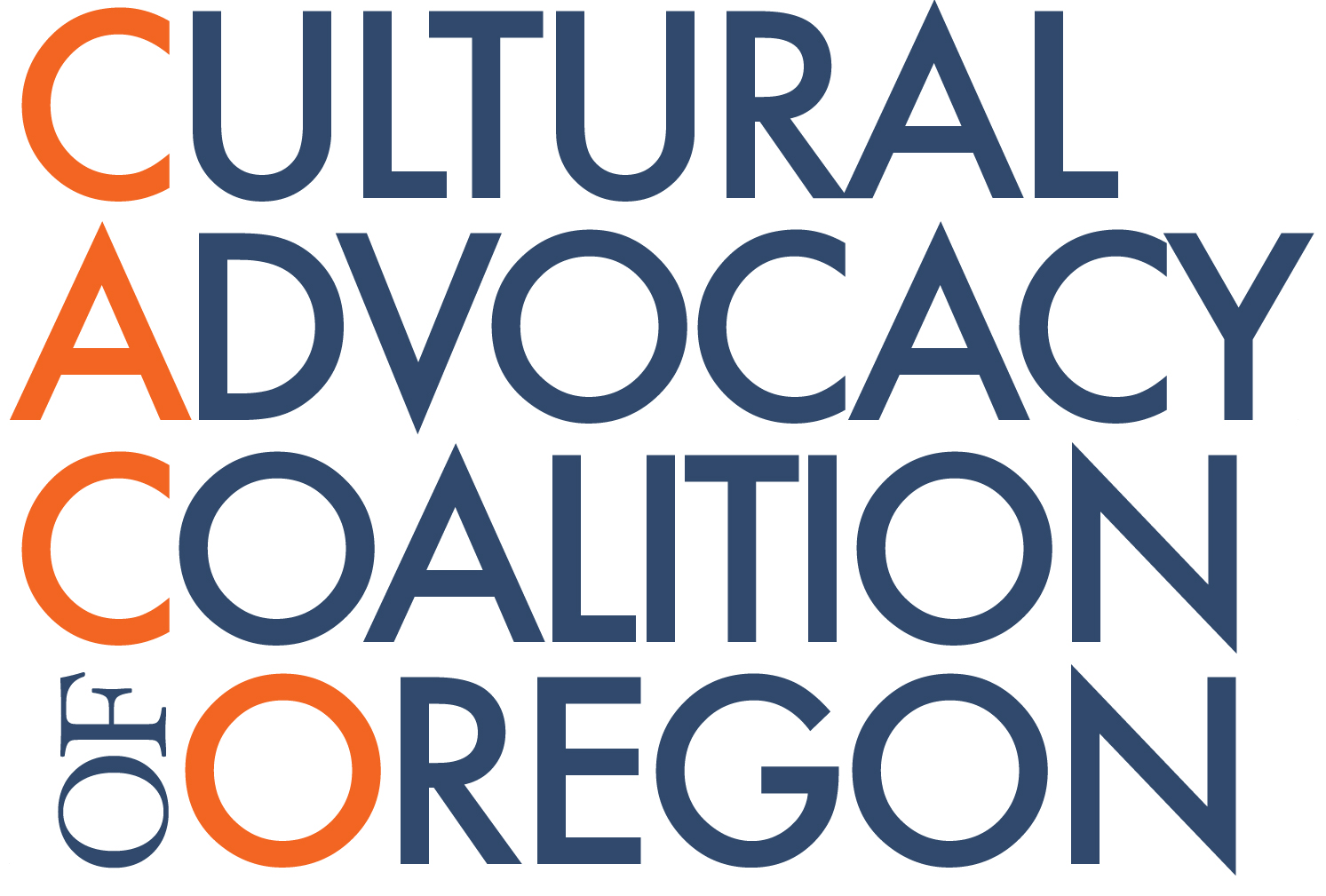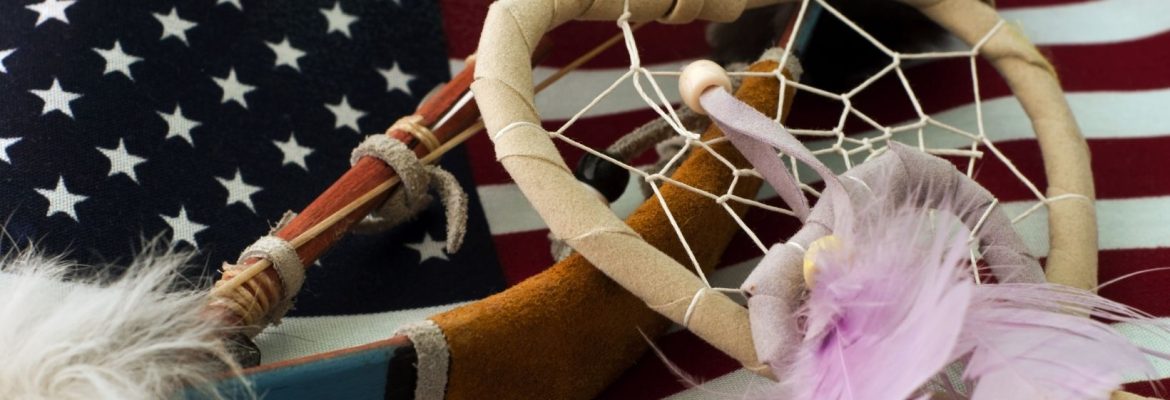Decolonizing Thanksgiving in Oregon
By Marie Gettel-Gilmartin, Fertile Ground Communications (written in 2021; updated for 2023 with items in blue text)
Many of us grew up learning the myth of Native Americans teaching the struggling pilgrims how to survive and celebrating with a feast in 1621. But for most Native Americans, Thanksgiving is a day of mourning.
Thanksgiving is in fact a holiday of colonizers.
What actually happened on Thanksgiving?
As Claire Bugos writes in the Smithsonian, “Massacres, disease, and American Indian tribal politics shaped the Pilgrim-Indian alliance at the root of the holiday.” The settlers stole land, spread disease, and exploited resources from the Wampanoag tribe. Then King Philip’s War “devastated the Wampanoags and forever shifted the balance of power in favor of European arrivals.”
Each year, Native American people gather to honor their ancestors and the struggles of Native peoples on the National Day of Mourning. Thanksgiving serves as a reminder of the unjust treatment that Native Americans have continued to receive since the 1620 Plymouth landing.
What is Oregon doing to shift the narrative about native stories and honor native peoples?
- The Native American Youth and Family Center (NAYA) and the Native community celebrate a worldwide social event, Rock Your Mocs, by wearing moccasins to unite, celebrate tribal individuality, and honor ancestors and indigenous peoples worldwide (Nov. 12-18 this year). Search #ROCKYOURMOCS to check out the collection of photos.
- Our member organization, the Native Arts and Culture Foundation, is a Native-led national organization committed to mobilizing Native artists, culture bearers, communities, and leaders to influence positive social, cultural, and environmental change. The foundation has provided $14 million in 594 grants to 394 Native artists and organizations in 34 different states and the District of Columbia. Their center opens monthly for a tour, where you can connect with their community of Native makers and cultural innovators.
- The recently rebranded and reopened Five Oaks Museum in Beaverton is now centering descendant communities in all storytelling work. Visit the museum to learn about the Kalapuya Tribe and Kalapuyan land thanks to guest curator Steph Littlebird Fogel and other Native American experts.
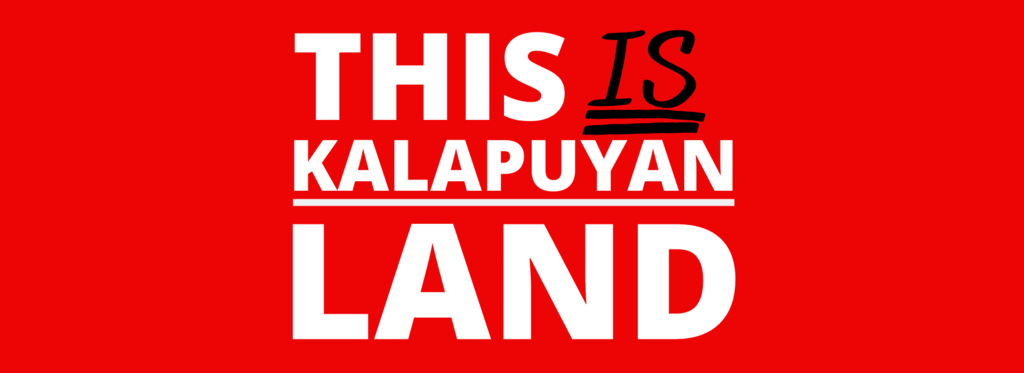
- The Grand Ronde tribes have an excellent collection of tribal history curriculum videos for grades kindergarten to tenth.
- Oregon universities and colleges now offer financial assistance to members of the 574 federally recognized Tribes.
- The Oregon Department of Education rolled out a “Tribal History/Shared History” curriculum in 2020. Oregon schools now have historically accurate and culturally inclusive lessons about Native Americans. Oregon’s nine Tribes collaborated on this curriculum to banish stereotypes, myths, and inaccuracies.
- The Oregon Food Bank honors the National Day of Mourning, acknowledging that Native Americans experience food insecurity at a staggeringly high rate and some of the most anti-Native policies happened in Oregon.
- The University of Oregon’s Native American Student Union hosted “Thanks But No Thanks-giving: Decolonizing an American Holiday” in 2020 and 2021, where they discussed ways to show gratitude while decolonizing the holiday.
What can we do in our organizations or at home to decolonize Thanksgiving?
- Think about what you eat for Thanksgiving dinner. How did these foods come to you? You can buy American Indian foods from local tribes and businesses.
- Stand with the Portland Native community by attending Unthanksgiving gardening events on November 23-25. UnThanksgiving has expanded to three organizations this year: NAYA Community Garden, Prismid Sanctuary, and Wapato Island Farm. Wear attire appropriate for the weather and for gardening, bring gloves, a water bottle or thermos to keep you hydrated, and tools. Registration is required and can be found here: https://forms.gle/5kn8yW4AtWFSaGVt8
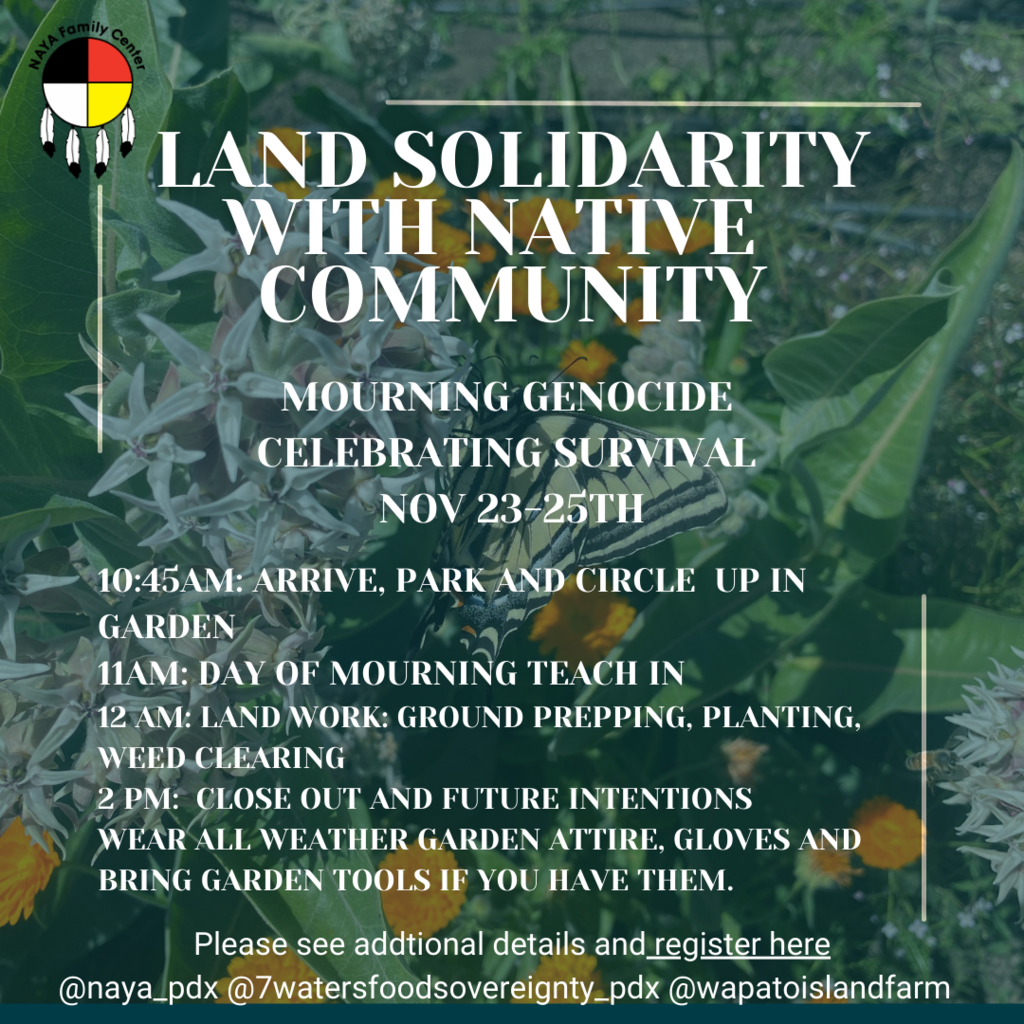
- Support Indigenous artists and entrepreneurs at the Indigenous Marketplace events on Nov. 24-26 or Dec. 6-8 and the Native American Youth and Family Center’s Winter Native-Made Marketplace on Dec. 9-10 at Lloyd Center.
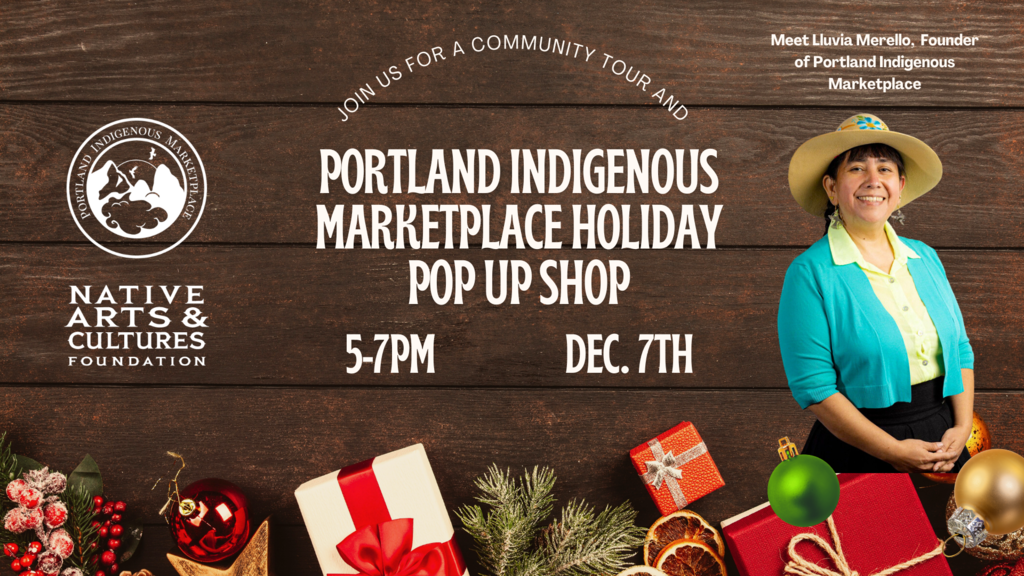
- Buy from Oregon’s Native artists and performers, as we shared in this article from 2022.
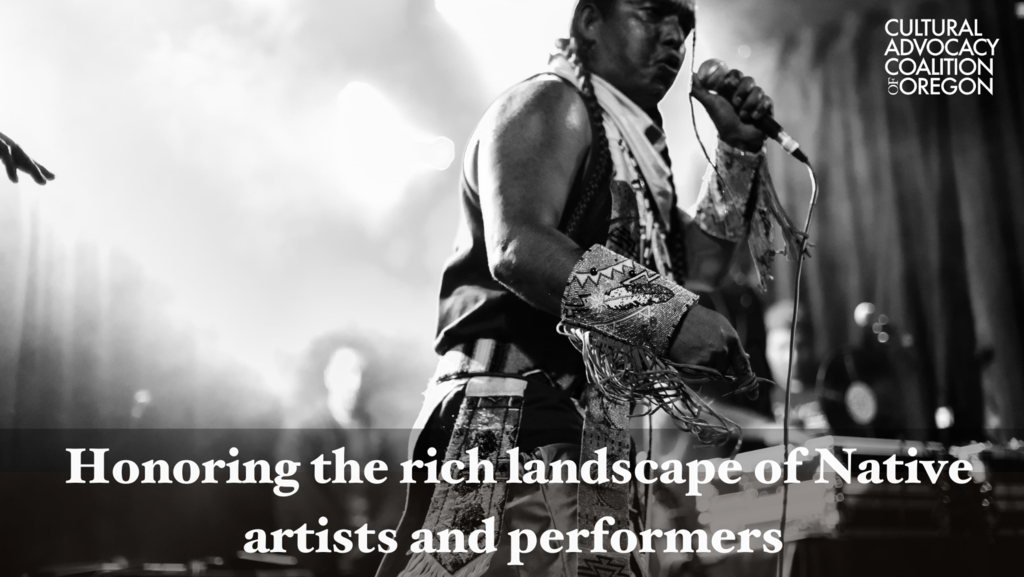
- Visit the “We Are the Land” public art installation in Portland, a collaboration between the City of Portland and indigena (an Indigenous storytelling cooperative), the City Arts Program, Regional Arts and Culture Council, Multnomah County, and Metro.
- Learn which Tribes are native to Oregon.
- Donate to and follow local Native American organizations, such as the Native Arts and Cultures Foundation, the Native American Youth and Family Center, and Wisdom of the Elders.
- Visit Native-owned farms and restaurants around the state and buy from Native-owned businesses.
- Plan an Oregon vacation to celebrate Indigenous Oregon by visiting Travel Oregon’s website.
- Listen to perspectives on thanksgiving from Wampanoag youth or watch a brilliant Native American film.
- Rent the Oregon Historical Society’s “Oregon is Indian Country” traveling exhibit for free through 2023. It’s displayed in the City of Eugene from Nov. 27-Dec. 3, 2023.
- Unlearn myths with your kids. The Portland Public Schools website has some excellent resources. Read books about Thanksgiving by indigenous authors, such as Catherine O’Neill Grace’s 1621: A New Look at Thanksgiving and Joseph Bruchac’s Squanto’s Journey: The Story of the First Thanksgiving. Or use this great hands-on activity from Teaching Tolerance. Get adult book suggestions from firstnations.org.
- Support contemporary Indigenous struggles by learning about the #LandBack movement and current land struggles faced by the Mashpee Wampanoag people. The U.S. Department of Arts and Culture has a virtual resource pack on its Honor Native Land page.
- Find out what your community is doing to support the Missing & Murdered Indigenous Women’s crisis.
- Follow the work of indigenous-led organizations such as Native American Rights Fund, Illuminatives, National Congress of American Indians, and the American Indian College Fund...or organizations here in Oregon.
Arts and culture are two of the best ways to honor Native Americans and decolonize Thanksgiving, as we’re reminded by Joy Harjo, U.S. Poet Laureate and board chair of the Native Arts and Culture Foundation:
“We’ve come to a point in the world of great challenge, but also great opportunity, in which to revise and revitalize our communities. How do we do that? It always comes back to the arts, because arts revitalize, they tell us who we are, they tell us where we’re going and where we’ve been. Art makes connections on a deep soul level; it connects us in a way beyond words.” -Joy Harjo
We can still be thankful while acknowledging the harm done to Native peoples by this holiday. To decolonize Thanksgiving, we need to examine our history to begin the healing process.
The Coalition acknowledges the many Tribes and bands who call Oregon their ancestral territory, including: Burns Paiute; Confederated Tribes of Coos, Lower Umpqua and Siuslaw; Confederated Tribes of Cow Creek Lower Band of Umpqua; Confederated Tribes of Grand Ronde; Confederated Tribes of Siletz Indians; Confederated Tribes of Warm Springs; Confederated Tribes of Umatilla Indian Reservation; Coquille Tribe; and Klamath Tribes. We honor the ongoing relationship between the land, plants, animals and people indigenous to this place we now call Oregon. We recognize the continued sovereignty of the nine federally recognized Tribes who have ties to this place and thank them for continuing to teach us how we might all be here together.
